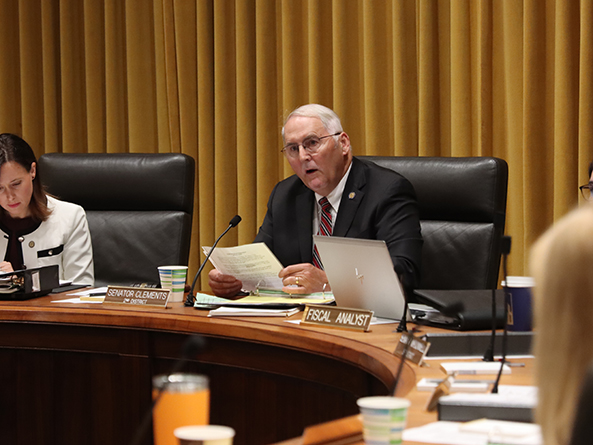Budget changes considered to help fund governor’s tax plan
The Appropriations Committee heard joint testimony July 30 on two bills intended to help fund the governor’s property tax relief proposal.

LB2, introduced by Elmwood Sen. Robert Clements at the request of Gov. Jim Pillen, would reduce reappropriated general funds — also known as carryover funds — from fiscal year 2023-24 and FY2024-25 by $116.7 million across more than 40 state programs.
The measure also would reduce general fund appropriations by approximately $83 million annually, some of which would be offset by cash fund transfers.
LB3, also introduced by Clements at the request of the governor, would authorize and provide for fund transfers, change certain fund transfer provisions, change application of investment earnings and amend certain fees.
The bill would reduce the state’s Cash Reserve Fund by $235 million and eliminate the crediting of accrued interest to more than a dozen cash funds. Those dollars instead would be directed to the state’s General Fund, at an estimated rate of approximately $35 million annually.
In addition, LB3 would remove statutory caps on fee structures for more than two dozen state programs, instead allowing them to set fees based on the annual percent change in the Consumer Price Index or as required to pay the costs of program administration.
The bills were presented to the committee by State Budget Administrator Lee Will, who called the proposal a “commitment to all Nebraskans that the state will continue to do more with less.” He said the cuts were recommended after an evaluation that took into account potential projects and ongoing agency needs.
Will said the changes would “rightsize” fee structures and ensure that taxpayers aren’t subsidizing user-fee based programs, such as inspection and permitting programs. In addition, he said, the governor’s office remains committed to drawing down all available federal funds to the state to help offset reductions outlined in the proposal.
“It is our view that nearly every agency must contribute to the effort of tax reform to ensure that we can thrive and grow as a state,” Will said.
A small number of code agency directors — those who are appointed by the governor and report directly to him — testified in favor of the proposal, including Steve Corsi, CEO of the state Department of Health and Human Services.
Corsi said the department is leveraging federal funds to offset the loss of millions of dollars to various division programs under the proposal. As a result of that influx of federal money and other efficiencies, he said, services would not suffer.
“I am absolutely not concerned about the future,” Corsi said.
Heidi Ore, testifying on behalf of the Foster Care Review Office, opposed LB2. She said the office, an independent state agency charged with oversight of Nebraska’s foster care system, would lose more than 10% of its base funding under the proposal.
That change could jeopardize federal IV-E funds, she said, and lead to “immediate” staff layoffs.
“We ask that you not cut corners when it comes to the lives of children in out-of-home care,” Ore said.
Nebraska Secretary of State Bob Evnen opposed a proposed $250,000 reappropriation in LB2 of Election Administration program funds. He said those dollars are needed to continue a voter education campaign regarding the state’s new voter ID law ahead of the November general election.
Several testifiers, including Nebraska Game and Parks Commission director Timothy McCoy, expressed concern about the proposed shift from state general funds to a greater reliance on user fees for some state agencies.
He said the commission likely would need to raise park permit, camping, lodging and park activity fees by 26% to make up for lost funding under the governor’s proposal.
“We do not want to price people out of their state park system,” McCoy said, adding that the state needs to remain competitive with fees charged by neighboring states as well.
Testifying in opposition to both bills was Joey Adler Ruane of OpenSky Policy Institute. He called the proposal “unprecedented” outside of a significant financial crisis that would negatively impact 22 state departments.
“Absorbing this level of cuts will undoubtedly make it more difficult for these critical agencies to provide programming and services at the levels necessary to serve all Nebraskans,” Adler Ruane said.
The committee took no immediate action on either proposal.


